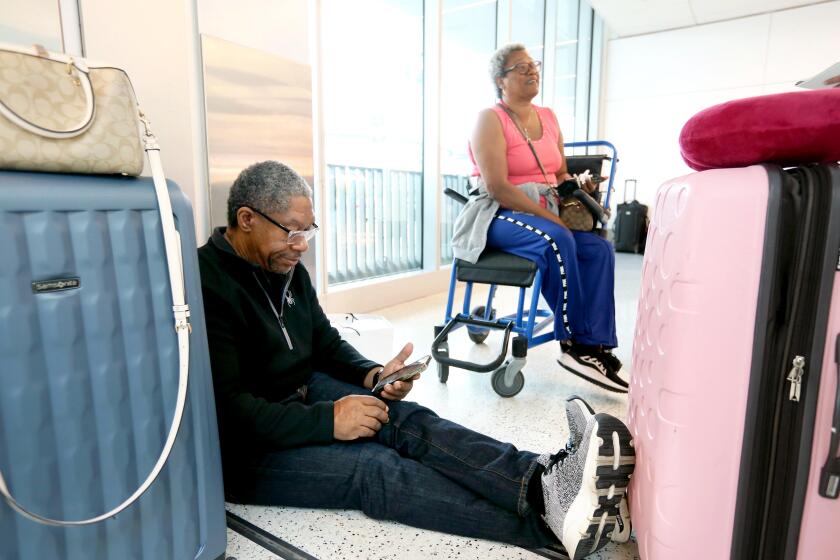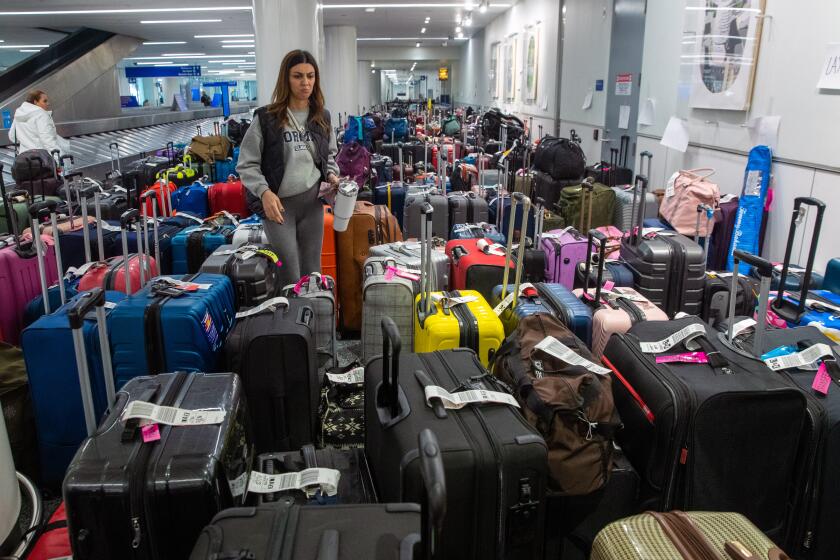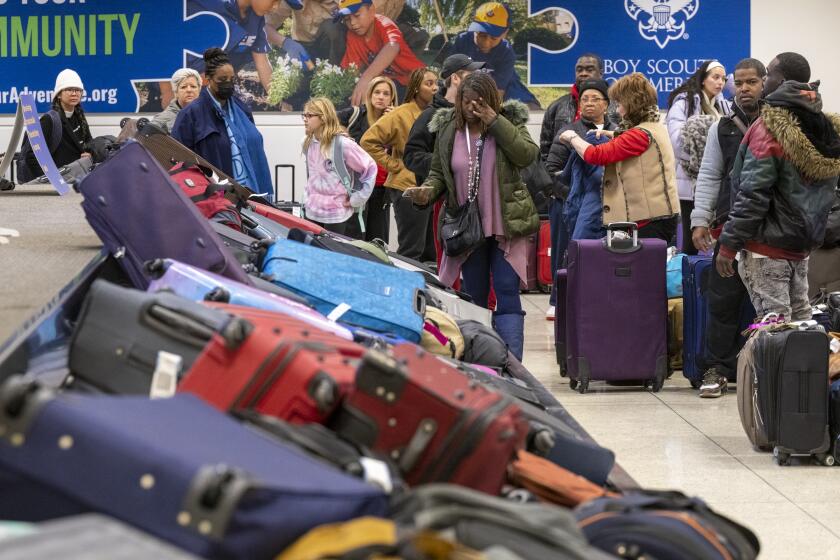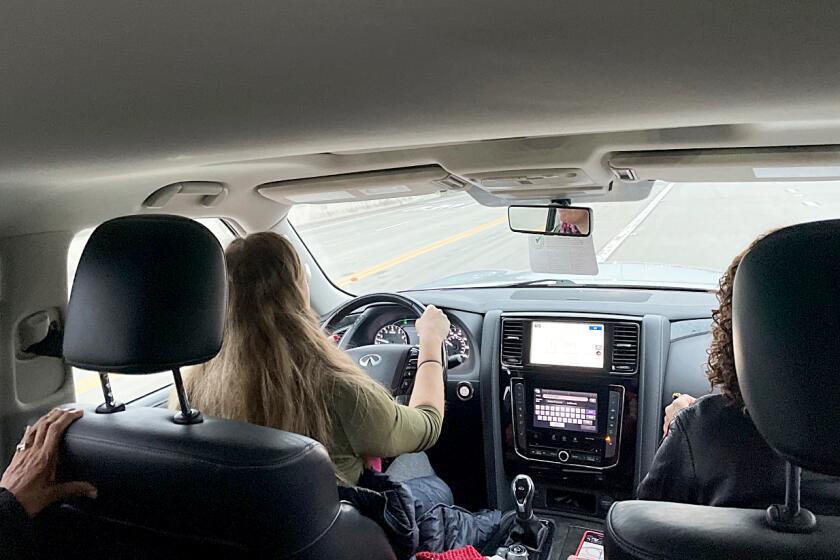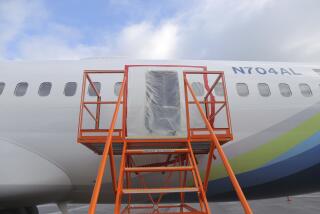Southwest Airlines’ silver lining: Memories of blunders fade fast
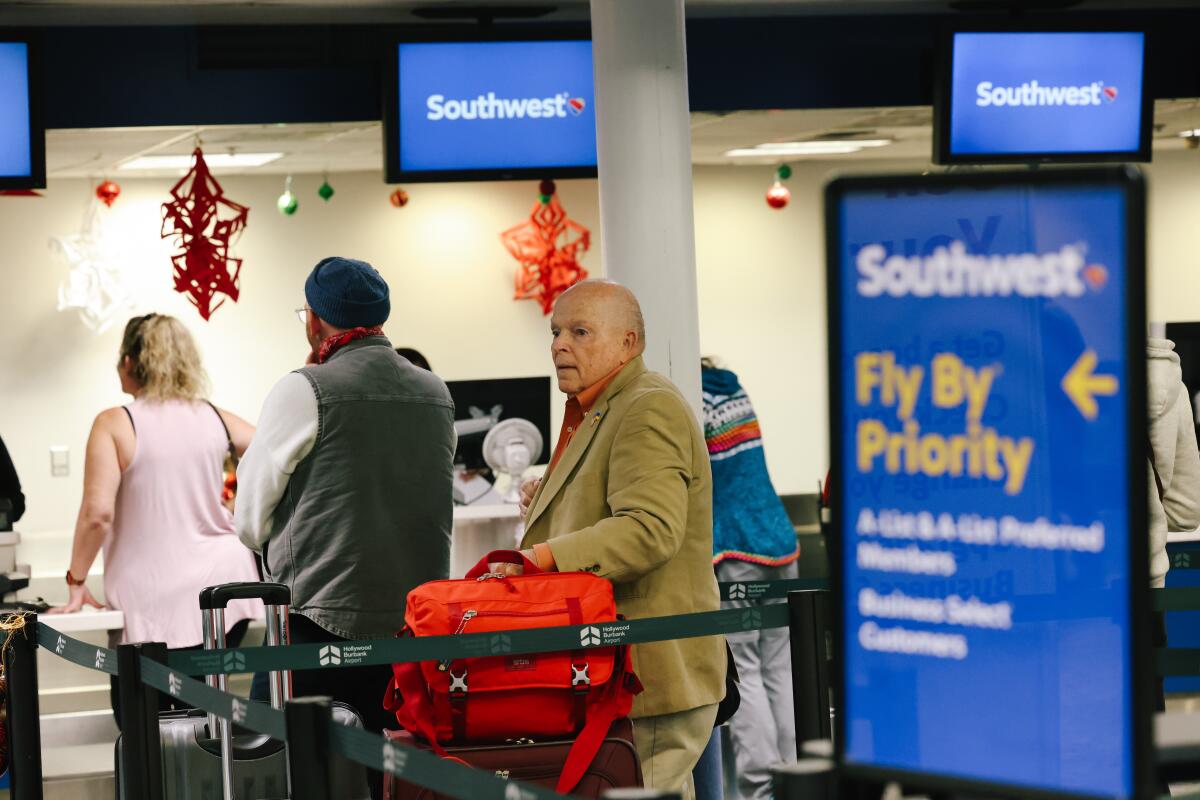
- Share via
Southwest Airlines’ 2022 nightmare before Christmas is unlikely to inflict long-lasting damage to the carrier’s reputation if management compensates customers and makes good on vows of operational changes, communications and management professionals say.
In recent days, social media have been flooded by angry Southwest customers after storms and shaky computer systems forced the airline, the largest domestic carrier in the U.S., to cancel more than 13,000 flights. Chief Executive Bob Jordan has issued multiple apologies while employees work overtime to clean up the mess, which officials in Washington vow to scrutinize.
Yet even a meltdown of this magnitude poses little long-term threat to Southwest. The carrier will need to prove it has remedied the technical problems that contributed to the crisis and offer customers generous compensation.
The first test for the airline, which didn’t respond to a request for comment, comes Friday as the carrier attempts to resume normal operations.
“They’ve gone into the year with a lot of goodwill in the tank,” said Jay Sorensen, a former marketing executive at Midwest Airlines who is now president of IdeaWorksCompany, a consulting firm. “I don’t see long-term damage to Southwest Airlines unless they completely botch the recovery.”
Southwest Airlines now has to rebuild its tarnished reputation while working to help passengers get refunds and find lost luggage.
Customer-service blunders like Southwest’s spark a harsh public backlash and prompt corporate leaders to promise changes. But the gaffes often are soon forgotten.
United Airlines came under withering criticism in 2017 after a 69-year-old passenger getting dragged from a plane was caught in a video that went viral. The company reached a private, out-of-court settlement with the individual.
Aside from a lengthy run of bad press and public outcry, “none of that really had much of an impact” on United, said David Austen-Smith, a business professor at Northwestern University whose work includes corporate ethics and crisis management.
“The bottom line is when people buy airline tickets they look for price and convenience,” he said. “Southwest delivers price and convenience, and for the most part they’re reliable.”
That doesn’t mean the airline won’t suffer some fallout. Consumers are likely to book with other carriers into the first quarter of next year, although that will likely moderate in later months, according to Savanthi Syth, an analyst with Raymond James Financial Inc. who recommends buying the stock.
Southwest Airlines, like so many American companies, spent money on dividends and stock buybacks instead of technology and infrastructure.
Softness in bookings may last “until the half life of the anger is over and people are making spring-break plans,” said Andrew Davis, a former transportation analyst with T. Rowe Price Group Inc., which is a long-term airline investor and currently Southwest’s fourth-largest shareholder.
“This time next year, just as many people who were going to fly on Southwest will again,” he said.
Shares of Southwest began rebounding Thursday but were still down more than 9% for the week. Analysts have estimated the crisis may cut fourth-quarter profit by up to 5%.
Working in the industry’s favor is a paucity of alternatives to long-distance travel in the U.S. That makes it harder for customers to shun a carrier over shoddy service.
“That’s given the industry a certain level of confidence that they can get away with more than other industries, and they’re right,” said Eric Dezenhall, chief executive of crisis-management advisory Dezenhall Resources.
Thousands of travelers have been stranded at airports or stuck on hold trying to rebook flights as a massive storm snarled travel in the U.S. and Canada.
Internally, such a crisis can be all-consuming for a company. And although industry watchers say the incident is unlikely to put Southwest’s leaders in jeopardy, it will fuel plenty of scrutiny.
“The board’s going to worry. The board has to worry,” said Davia Temin, founder of New York-based crisis consultancy Temin & Co. “The board is responsible for making sure that reputation is as good as it can be and that there are crisis management plans even for the unthinkable.”
Corporate meltdowns that capture the public’s attention often fuel speculation about a company’s possible demise, Dezenhall said. But that rarely happens without clear wrongdoing by an individual.
“People tend to move on once they’re made whole in some way,” he said. “They’re still angry, but they got some goodies out of it.”
Southwest has pledged to honor “reasonable requests” for reimbursement from customers who incurred lodging, meal and alternate transportation costs after their flights were delayed or canceled.
Southwest cancellations bring four strangers together.
Davis, now a senior vice president of strategy and investment at Cox Enterprises, said the airline will also likely offer customers a generous travel voucher or discount.
“A pretty significant one — probably the biggest you’ll ever see,” he said.
Starbucks Corp. touched off a fiery controversy over race after a 2018 incident in which two Black men were arrested at a Philadelphia store after one asked to use the restroom without placing an order while waiting for another guest to arrive.
Video of the incident spread widely online and the hashtag #BoycottStarbucks trended on Twitter. After an apology from then-CEO Kevin Johnson, the coffee chain closed more than 8,000 stores for anti-bias training and set a policy that its restrooms would be open to all. It has also made corporate diversity data public and released details about its inclusion initiatives.
Jordan, Southwest’s CEO, has already taken steps to rebuild the public’s trust. In addition to his apologies, he’s told employees, “I’m accountable for this,” and vowed to “double down” on plans to upgrade the systems that were overwhelmed.
“It isn’t enough for even a well-meaning CEO to give his word,” Temin said. “It has to start a real series of events and change.”
More to Read
Inside the business of entertainment
The Wide Shot brings you news, analysis and insights on everything from streaming wars to production — and what it all means for the future.
You may occasionally receive promotional content from the Los Angeles Times.
